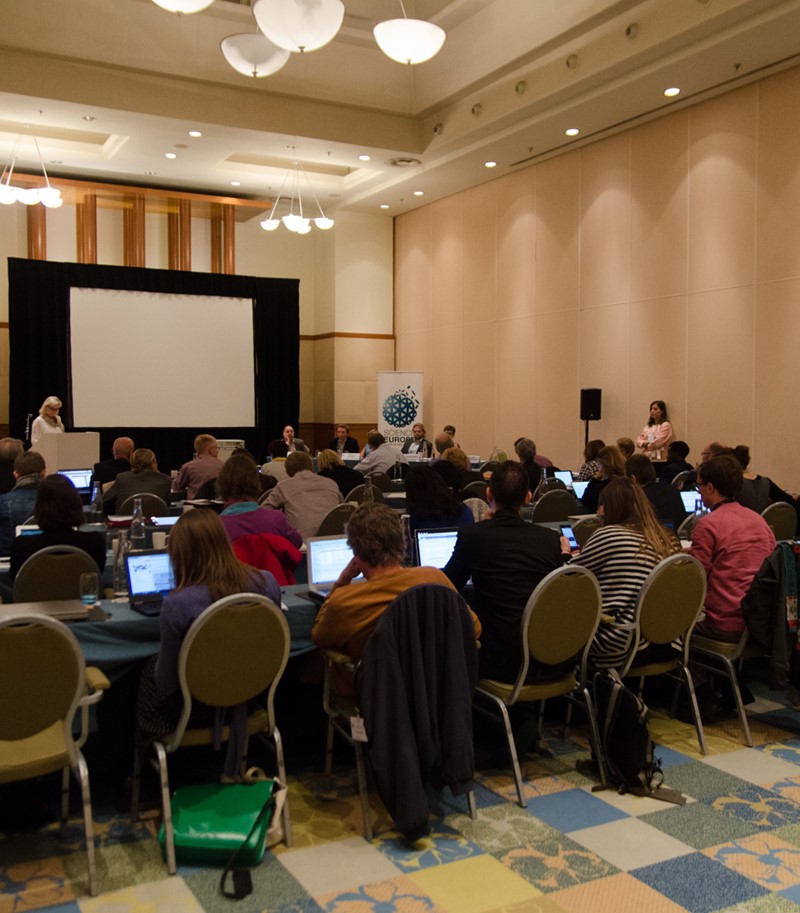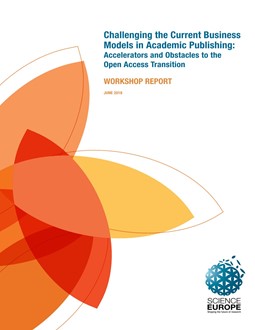
-
Share on
Workshop on Challenging the Current Business Models in Academic Publishing
On 26 and 27 April 2017, Science Europe organised the workshop ‘Challenging the Current Business Models in Academic Publishing: Accelerators and Obstacles to the Open Access Transition’, in collaboration with the Association of European Research Libraries (LIBER) and the European University Association (EUA).
The workshop brought together fifty experts from research funding and performing organisations, universities, libraries, OA publishers, and individual researchers to discuss and challenge current licensing practices.
The topic of ‘Big Deals’ was at the forefront of the discussions. Big Deals are the dominant business model in academic publishing. They were introduced to answer the so-called ‘serials crisis’ that occurred in the subscription model about two decades ago. The logic and business structures behind Big Deals are increasingly employed to shape the transition from the subscription world into an OA publishing paradigm based on article processing charges (APCs). While Big Deals have advantages, they also have severe disadvantages, and thus they are a highly disputed business model.
Day one of the workshop focused on the role of Big Deals in the context of the transition to OA. In his keynote address, Ted Bergstrom, University of California, argued for ‘à la carte’ prices instead of journal bundles prices. “We are not in a prisoners’ dilemma”, he said, “there are ways to find a good equilibrium.” Some of his suggestions were to place caps on payments of APCs, get large universities to cancel Big Deals, or to encourage University Provosts and government agencies to reduce their allocation of funding to journal subscriptions by a fixed percentage per year.
This was followed by presentations from Big Deals negotiators (Liam Earney from JISC and Robert van der Vooren from VSNU), who touched upon the issue of cost structures, transparency and diversity of the landscape. They also underlined the need to monitor progress for compliance. Xenia van Edig, Copernicus, presented the point of view from pure OA community publishers and addressed the potential and risks of Big Deals. Emma Wilson, Royal Society of Chemistry, highlighted a change in customers’ requirements and a more global perspective, with China taking a dominant place in research publications.
Day two of the workshop focused on alternative business models. In his keynote, Cameron Neylon, Curtin University, stressed that “knowledge is a club good” and that “collective (public-like) goods are difficult for large groups to provision.” He highlighted that small groups can work together while large groups will fail, except under specific circumstances. He advised to: focus on community building; support collective models; define service requirements; and build OA infrastructures.
Expert presentations and panel discussions explored the topic of alternative models, such as the Wellcome Trust Publishing Platform presented by Hannah Hope, the researcher-led initiative SciPost presented by Jean-Sébastien Caux, the Knowledge Unlatched model in Humanities and Social Sciences presented by Max Mosted, and the FAIR Open Access Model and LingOA presented by Saskia C.J. de Vries.
In his closing speech, Jos Engelen, former President of the Netherlands Organisation for Scientific Research, said that “as long as our research assessment procedures lean on ‘reputations’ of journals and on ‘impact factors’, we will never succeed in imposing our will (and that of our governments) in achieving a speedy transition to OA publishing.” He added that “Big Deals (...) are not a promising road to gold OA”, and made some final recommendations, such as to:
- stop unproductive (public) discussions about ‘research budget’ versus ‘library budget’ to pay for OA;
- get rid of Big Deals and make ‘à la carte’ deals;
- help new OA initiatives and support those that are promising;
- and try to make a coalition with very influential organisations like the Wellcome Trust.
He ended his speech by stating that “the OA community should learn to make one front and speak with one voice. Accept that several gold OA models can coexist! Don’t wait for a perfect solution and start by implementing perfectly adequate ones.”





